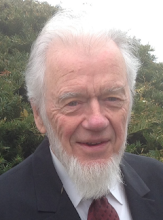I still have not read Mark Heim's writing on this subject, but it seems completely unlikely that "our religious life/beliefs can create the afterlife we find following death." How could that possible be? Belief in a heaven with streets of gold creates such a place? I cannot see how that could possibly be true.
But if there absolute Truth, as I affirm, how do we know such truth? Well, we don't know it absolutely. So here there is a lot of commonality between my protagonist and me. Our beliefs, and even our assertions, about what is true are relative, related to context, and not subject to proof. All knowledge is personal knowledge.
The latter statement comes from the seminal work of the Hungarian scientist/philosopher Michael Polanyi (1891-1976). His Gifford Lectures given at the University of Aberdeen in 1951-52 were later published as Personal Knowledge (1958). In the 1960s I spent many, many hours reading that difficult book and preparing a seminar paper on it. Later, I wrote essay about Polanyi that was published as one chapter in Science, Faith, and Revelation (1979), edited by Bob E. Patterson. I wrote that chapter during the year we lived in Liberty in 1976-77. I was teaching part-time at William Jewell that year, and remember well working on it in my provisional faculty office on the sub-floor of the library.
Polanyi states that the purpose of his book was "to achieve a frame of mind in which I may hold firmly to what I believe to be true, even though I know that it might conceivably be false" (Personal Knowledge, p. 214). That is an important frame of mind, I believe. But that does not mean falling into complete subjectivism or relativism. Polanyi also writes, convincingly, about the "intellectual passion" (also called the "heuristic passion") for finding truth and the "persuasive passion" by which one seeks to convince others of the truth discovered.
As I am always seeking a valid position between polar extremes, through the years I have found Polanyi's position a viable one, standing between objectivism and subjectivism as well as between absolutism and relativism.

One of my revered "thinking friends" wrote,
ReplyDelete"So, all knowledge is personal knowledge. Is all knowledge only personal knowledge? Frequently, people in disciplinary communities, reflect on 'what do we know and what don't we know about this subject?' Community agreement in physics establshes claimed personal knowledge as validated communal knowledge. So, when a scientist in Utah claims he knows how to produce cold nuclear fusion, other scientists call him to submit his conclusions to the guild of physicists. It might be possible to think one knows something and to be self-deceived. What kind of knowledge is this? (It's also possible for an entire community to be wrong about a subject--say, a geocentric cosmology.)"
While knowledge is personal, it is never private. Polanyi places great stress upon the community or society in which one lives. We "know" things because of the presuppositions we share with a community.
ReplyDeleteThis is true, of course, for scientists as well are for others. Much of what Polanyi wrote was directed toward scientists and scientific knowledge. His point was that even the latter is never completely objective.
Knowledge is always tentative. And there is no proof; there is only belief. Thus, there is always the possibility of being wrong. One "can only believe something that might be false," says Polanyi--and he adds that that is his argument "in a nutshell" ("Personal Knowledge," p. 312).